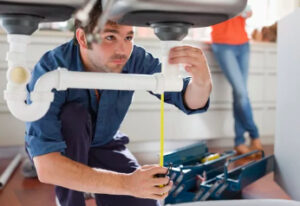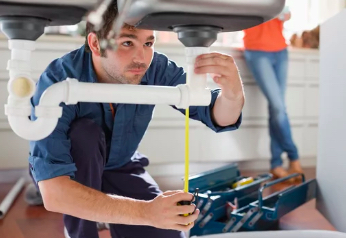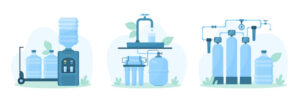Many homeowners encounter clogged toilets at some point. Basic methods can remove a basic blockage, but it’s time to call a plumber when those methods fail, or there’s an ongoing issue with your drain lines. Prevent recurring toilet clogs by practicing good toilet etiquette, using biodegradable drain cleaners, and having your sewer line regularly inspected.
Notice frequent toilet clogs, even after using a plunger or drain snake. It may be time to call Plumbers Aurora CO. Frequent clogs could also signify a more serious plumbing issue that requires professional attention, such as crumbling or breaking pipes that need to be replaced.
Your home’s sewer line is responsible for moving waste and water out of your house to the local sewage system or septic tank. It is protected from dirt and weather conditions due to being underground, but it can still experience problems that require professional help. Sewer line blockages, including breaks and tree root penetrations, often cause recurring toilet clogs because they impact drainage across your entire plumbing system.
Your home’s plumbing vents allow fresh air into the plumbing systems to prevent an air-pressure vacuum from forming and hindering drain flow. These can become blocked with sticks, leaves, or animal nests that reduce vent flow and create an airlock that causes drains to clog. A plumber uses special tools to clear plumbing vents and repair them if needed.
Symptoms
There are a few warning signs that you should be aware of to prevent clogged toilets and other plumbing problems. For example, if you find gurgling sounds coming from your bathroom or the water level in your toilet bowl is too high, it is a good idea to call a plumber as soon as possible. Similarly, if your toilet drain lines connect to other water-carrying pipes (such as the washing machine), problems in those pipes can also affect your toilets. In these cases, the plumber may need to inspect and clear clogs or perform sewer line repairs to restore drainage flow. This is more complicated and expensive than a simple blocked toilet, so it is always better to call in a professional than try to tackle the problem yourself.
Repairs
Plumbers are responsible for a wide range of repairs. Some, like clogged drains or broken toilets, are urgent and require immediate attention. Others, such as a water heater that’s leaking, are less pressing but still need to be fixed. In any case, plumbers are professionals who are knowledgeable and experienced. They also have the necessary tools and equipment to perform their job effectively. This is why it’s important to hire a licensed plumber.
The most common plumbing repair involves unclogging a sink or bathtub. Plumbers typically use specialized equipment to clear blockages, such as drain snakes and hydro jetting machines. These tools help to remove stubborn clogs without causing damage to pipes or the surrounding area. Another common plumbing repair is fixing a leaky faucet. This is often an easy fix for homeowners, as they can purchase a simple kit from most hardware or home improvement stores. A plumber will also be able to install the kit correctly, so you won’t have any issues with the new faucet in the future.
Some clogs are more serious than others, and they may affect the entire household’s drainage system. For example, a sewer line clog can impact the toilets, showers, and washing machine in the home. These clogs usually occur when items such as hair, soap scum, and grease are allowed to enter the drain line and accumulate. In addition, tree roots can penetrate the sewage lines and cause problems with your drains.
Plumbing repairs can also involve repairing or replacing pipes. Sometimes, a section of pipe can get damaged or break. This can be caused by a number of things, including age, wear and tear, and improper installation. Plumbers can replace these pipes with similar-sized ones, or they can install a new pipe altogether.
Other common repairs include installing or repairing water filters and addressing water quality issues such as acidity or hardness. These issues can be difficult for homeowners to notice, but plumbers will be able to identify and resolve them quickly.
Some of these repairs can be done by homeowners, but it’s always best to leave them to a professional. If a homeowner attempts to do these repairs themselves, they could make matters worse and end up costing more in the long run. Plus, it’s safer for the plumber to do these jobs with the proper tools and equipment.
Call a Plumber
If you are unsure about how to fix your clogged toilet, or simply don’t have the time, it is a good idea to call a plumber. They will be able to provide you with expert advice, and quickly fix your problem. Plumbers have a lot of different tools at their disposal, and can tackle a variety of issues that may arise in homes or businesses. They are also experienced in dealing with plumbing systems of all sizes, and can work on a wide range of fixtures.
Plumbing jobs can vary in difficulty, and some are more dangerous than others. For example, a plumber working on sewer pipes will likely be exposed to human waste, which can contain dangerous microbes. These microbes can cause illnesses such as cholera, typhoid, and hepatitis. It is therefore important to ensure that any plumber you hire has the proper training and certifications.
There are many routes to becoming a plumber, but most follow an apprenticeship program that combines classroom instruction with on-the-job experience. These programs typically last four to five years and include a set amount of educational hours and a certain number of paid on-the-job training hours. Plumbers also must be licensed in most states to practice their trade.
One of the most common reasons to call a plumber is for clogged drains and toilets. If your drain is clogged with food scraps, hair, or other detritus, it is not likely that you can clear it with a plunger alone. A professional plumber will have specialized tools that can quickly clear even the most stubborn drain clogs.
If your toilet is constantly overflowing, this is a sign of a major blockage in your main sewer line. This could be due to tree roots, a broken pipe, or another issue that only a professional can resolve. A sewage backup can lead to significant health and safety concerns, so it is important to call a plumber right away if you notice this happening in your home.
Plumbers can be found in a wide range of industries, from construction to retail. They are responsible for the installation, repair, and maintenance of all kinds of plumbing systems in residential and commercial settings. Their duties are to ensure that water and waste can be efficiently transported through pipes to the correct locations. They also install and maintain appliances such as sinks, bathtubs, and toilets. They may also be called to work on gas lines in some cases.


 Installation
Installation